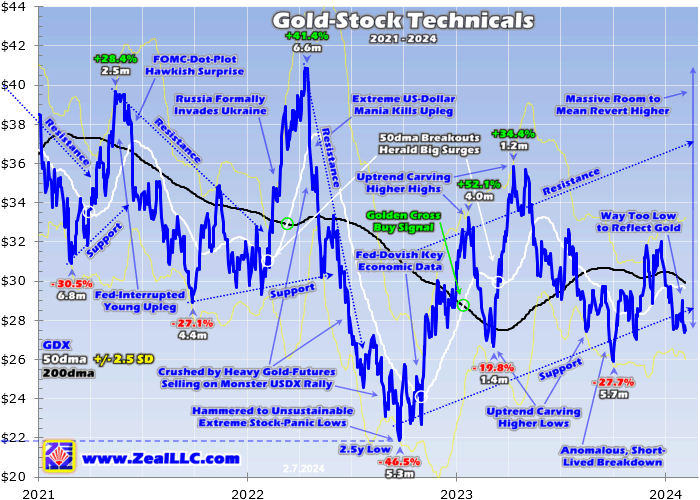Gold miners’ Q4 2023 preview

The gold stocks’ latest earnings season is nearing, and it should prove awesome. Plenty of the major gold miners were forecasting lower costs heading into year-end, which boost profits. Amplifying them much more, last quarter gold achieved its first record closes in several years. So this sector is preparing to report what will likely prove some of its fattest earnings ever, which ought to fuel some interest in gold stocks.
For thirty quarters in a row now, I’ve painstakingly analyzed the latest results reported by GDX’s major gold miners. This VanEck Gold Miners ETF dominates this sector, commanding 30.5x the assets of its next-largest 1x-long major-gold-miners-ETF competitor! Right after every earnings season, I dig into the latest quarterly reports from GDX’s 25 largest component stocks including the world’s biggest gold miners.
Interestingly Q4 data is the most challenging to analyze. Most gold miners operate on calendar years, so some companies simply report full-year results lumping in Q4. That leaves considerably-less quarterly detail than normal non-year-ending quarters. While some Q4 numbers can be backed out using Q3 year-to-date ones, not all can. So from a sector level, Q4 results are less granular than Q1, Q2, and Q3 ones.
Further complicating Q4 analyses, the regulatory filing deadlines after year-ending quarters run much later. Annual reports are way longer and require much more effort to prepare than quarterly ones. In the US, publicly-traded companies have to file 10-Q quarterlies with the SEC by 40 days after quarter-ends. But the deadline for full 10-K annuals extends to 60 days, so many gold miners report in late February.
These reporting deadlines are even looser in Canada, the epicenter of the gold-stock universe. Normal quarterly reports for larger gold miners are due 45 days after quarter-ends, but annual deadlines extend way out to 90 days! So plenty of Canadian gold miners don’t report Q4 results until late March. And on Canadian venture stock exchanges where smaller gold miners list, those deadlines are 60 days and 120 days.
So attaining a largely-complete picture on Q4 gold-stock sector results requires waiting well into March, when Q1 is almost over! As a speculator and investor I’ve always thought it frustrating to delay that long. I usually do my Q4 analytical work in March, rather than in the second months after normal quarter-ends. But after many years of digging into these quarterly and annual reports, some key results are predictable.
While gold mining is complex and challenging, gold-mining earnings are fairly simple. Profits are just the difference between prevailing gold prices and the costs of producing gold. So a great proxy for sector earnings subtracts the GDX-top-25 gold miners’ average all-in sustaining costs from quarterly-average gold prices. That reveals the major gold miners’ collective profits per ounce, illuminating key earnings trends.
While the cost side of this equation requires some estimates, gold prices don’t. In Q4’23, gold averaged $1,976 on close. That surged a big 14.2% year-over-year, and was just a hair under the all-time record of $1,978 from Q2’23! So last quarter gold was trading at record levels, and achieved its first new record closes in 3.3 years. That was no fluke either, with Q1’24 shattering that averaging $2,031 quarter-to-date.
Gold being 14% higher last quarter doesn’t just make for 14%-better earnings, as gold-mining profits leverage higher gold prices. A year ago in Q4’22, the GDX-top-25 gold stocks averaged $1,267 AISCs while gold averaged $1,731. That made for implied unit profits of $463 per ounce, about one-fourth up into the past 30 quarters’ range. If AISCs stayed flat and gold rallied 14%, earnings would surge way more.
Q4’23’s $1,976 average gold prices less $1,267 AISCs would yield $709 in unit profits, rocketing up 53.0% YoY! The gold miners’ big profits leverage to their metal is a primary ingredient in their allure. When gold is powering higher on balance, gold-stock earnings and stock prices usually soar. So mining costs aside, last quarter’s near-record gold prices alone greatly boosted profitability. Q4 results will look fantastic.
Most of the major gold miners provide all-in-sustaining-cost guidance, target ranges where they expect AISCs to shake out. Full-year guidances are usually given early in Q1s, then sometimes later refined after Q2 or Q3 results if production is better or worse than expected. Naturally Q3 guidances for any particular year are the most-accurate, as gold miners have three established quarters of production to predict from.
In their latest Q3’23 results, the GDX-top-25 gold miners averaged midpoint full-year-2023 AISC guides of $1,304 per ounce. That’s 2.9% higher than Q4’22’s, and in-line with Q3’23’s $1,304. But it’s important to realize that $1,304 is a full-year forecast. During 2023’s first three quarters, the major gold miners’ AISCs averaged $1,313, $1,380, and $1,304 per ounce. Average those, and they ran about $1,332 year-to-date in Q3.
To achieve that $1,304 average full-year midpoint guidance, Q4 AISCs have to drop low enough to offset 2023’s first two quarters’ higher levels. The number that makes that work is way down at $1,220 per ounce! I suspect that is a bit too optimistic, but the gold miners themselves are collectively predicting that Q4 will see last year’s lowest AISCs. $1,220 would prove their best quarterly average since back in Q4’21.
That’s not a big stretch, as that would merely make for a 3.7%-YoY decline from Q4’22’s $1,267. In Q3’23, the major gold miners’ average AISCs plunged 7.2% YoY to $1,304. But for conservatism’s sake, let’s assume the GDX-top-25 AISCs last quarter will shake out around $1,275. That would make for a slight 0.6%-YoY rise, and leave full-year all-in sustaining costs near $1,318. That really portends fat profits.
Last quarter’s $1,976 average gold price less $1,275 projected AISCs yields implied unit earnings of $701 per ounce. That would soar 51.3% YoY from Q4’22’s $463, and would prove the most-profitable quarter for major gold miners as a sector since Q2’21. That would also be over 2/3rds up into the GDX top 25’s 30-quarter range of per-ounce earnings. 2020 saw bigger profits before inflation started raging out of control.
That year GDX-top-25 AISCs averaged just $1,013, which was still much higher than all the years before. While there are some exceptional low-cost gold mines in the world, overall AISCs will never retreat back to pre-inflation levels. In just 25.5 months from February 2020 just before the pandemic-lockdown stock panic to April 2022, the Fed ballooned its balance sheet or the US monetary base by 115.6% or $4,807b!
As of last week the Fed’s balance sheet still remains 83.5% or $3,471b higher than pre-pandemic levels! And other major central banks followed suit in redlining their monetary printing presses in recent years. So with global money supplies far higher, general price levels including mining costs will never return to where they were. But that enormous monetary inflation baked into the world economy is very bullish for gold.
Global gold prices will almost certainly eventually normalize at levels reflecting this crazy money-supply growth. Gold averaged $1,577 in January and February 2020 before central banks panicked. Climbing 80% from there just to reflect the Fed’s huge dollar inflation alone not even considering the rest of the world’s would catapult gold near $2,839. Gold ought to continue climbing faster than AISCs in coming years.
With the major gold miners set to reveal blockbuster results in coming weeks, will traders care? Depends on these markets. Despite gold’s near-record Q4’23 and record-shattering Q1’24 so far, speculators and investors aren’t paying attention. The gold stocks continue to languish well out of favor, nowhere near reflecting today’s high prevailing gold prices. GDX has mostly drifted sideways on balance in recent months.

As of midweek, gold’s young upleg since its last major bottoming in early October clocked in at 11.7% gains. Yet over that same span, GDX has dismally only rallied 4.3%. That makes for terrible 0.4x upside leverage to gold. As gold stocks are much riskier than gold itself, they have to well outperform their metal on balance to be worth owning. Normally the major gold stocks of GDX amplify material gold moves by 2x to 3x.
So had this sector been performing properly, GDX would be between 23% to 35% higher over the past four months. In share-price terms, that equates to about $32.50 to $35.50. This chart would look much better if GDX was higher in that normal range rather than languishing near $27.50. Yet despite gold stocks’ ugly lagging recently, GDX remains in a well-defined bull uptrend born way back in September 2022.
Though gold-stock prices are far too low to reflect these high prevailing gold levels or their own earnings-driven fundamentals, traders don’t care. Both gold and its miners’ stocks remain deeply out of favor. In this kind of environment mired with apathy and bearish sentiment, it probably won’t matter how good of Q4 gold miners report. If traders are indifferent and not paying attention, they won’t even notice those results.
The main thing holding back this sector from blasting higher in a massive overdue mean reversion is gold sentiment. Despite its pair of new nominal records in December and near-record closes since, traders have all but abandoned gold leaving it for dead. It’s very unusual for gold records not to generate greed and mounting financial-media coverage. The culprit is almost certainly today’s incredible stock-market bubble.
Since early October, the flagship US S&P 500 stock index has rocketed 21.3% higher! It has achieved eight new record closes of its own since mid-January. Popular greed is rampant, and funds are rushing to buy the handful of mega-cap-tech market-darlings responsible for all the strong returns for fear of missing out. Never mind the S&P 500 components averaged dangerous bubble 30.6x P/E ratios exiting January!
Gold and thus gold stocks have always been alternative investments, essential portfolio diversifiers. But with stock-market euphoria extreme, increasingly-greedy traders increasingly expect the stock markets to keep surging indefinitely. So they don’t see any need to prudently diversify their stock-heavy portfolios. Gold has been forgotten as traders chase the mighty Magnificent Seven tech giants, despite their lofty prices.
The Mag7 averaged serious-bubble 49.4x P/Es as this month dawned! So these market-dominating leaders are extremely overvalued and overbought, thus overdue for a major correction-grade-plus selloff. When the stock markets decisively turn south and start crushing this excessive greed, some traders will remember gold. If that big reversal starts running before gold miners report Q4 results, they should matter.
After a quarter-century of studying markets full-time and writing financial newsletters about them, the gold psychology today reminds me of past major-stock-market toppings. Gold is often forgotten when stock markets grow so exciting they eclipse everything else. But eventually all that greed sucks in all-available near-term buyers, so overvalued and overbought stock markets roll over hard and stop overshadowing gold.
That dynamic will play out again in the inevitable next serious stock-market selloff. And gold’s upside should be supercharged since it is forging into record territory. New nominal records drive big bullish financial-media coverage, as evident in stock markets today. When that happens in gold, it attracts lots of new traders and capital accelerating gold’s gains. Gold’s last two uplegs achieving records crested in 2020.
They ultimately soared to massive 42.7% and 40.0% gains as traders chased gold’s upside! At best in late December, today’s young gold upleg was only up 14.2% despite seeing the first new record closes since 2020. Given all the bullish dynamics for gold today including hugely-inflated money supplies, it could easily extend this upleg’s gains to 40%ish in coming months. The gold stocks would soar on that.
During gold’s last record-achieving upleg in mid-2020, GDX skyrocketed 134.1% amplifying gold’s gains by an awesome 3.4x! Even for this gold upleg to merely grow to 25%, that would push gold way up near $2,275. That’s lots of new record closes over late December’s $2,077 to fuel big greed. The gold miners’ awesome results last quarter and in coming quarters should help reignite enthusiasm for this high-potential sector.
The biggest gains will be won by brave contrarians buying in early before other traders start aggressively chasing gold stocks’ strong upside momentum as gold’s upleg resumes. Thus GDX languishing near its secular bull uptrend’s support in recent weeks is a great opportunity. It’s never easy being contrarian and getting deployed before the herd stampedes in, but that’s the surest way to multiply wealth historically.
The bottom line is the major gold miners are likely to soon report blockbuster Q4 results. They’ve mostly guided to lower costs last quarter, while average gold prices surged to near-record highs. That is going to make for fat unit profits, greatly boosting overall earnings. Already strong and bullish, the gold stocks’ fundamentals are set to continue improving in coming quarters with these high prevailing gold prices.
Yet as gold and its miners’ stocks remain ignored and out of favor, traders haven’t figured this out yet. They are too captivated by the soaring US stock markets stealing all the limelight. But with valuations deep into dangerous bubble territory, a serious selloff is looming. Once stock markets decisively roll over to break that spell, alternatives led by gold will be remembered. That will fuel a massive gold-stock mean reversion.
(By Adam Hamilton)
{{ commodity.name }}
{{ post.title }}
{{ post.date }}




Comments
James
Sentiment for gold miners is at an all time low. Perhaps a great contrarian buy but at what opportunity cost? Speaking as someone who has held for some years but recently dumped NEM and just as well given the basket case it’s been in recent months since the Newcrest acquisition.
AISC’s may seem very attractive but aren’t most producers running large hedge books at lower gold prices, so not quite as much margin as one might assume on balance.
Given the management issues and production delays etc that so many miners seem to encounter year after year, I’m not surprised many investors stay away.